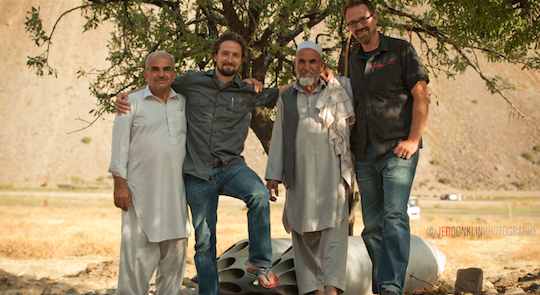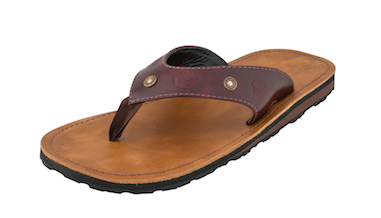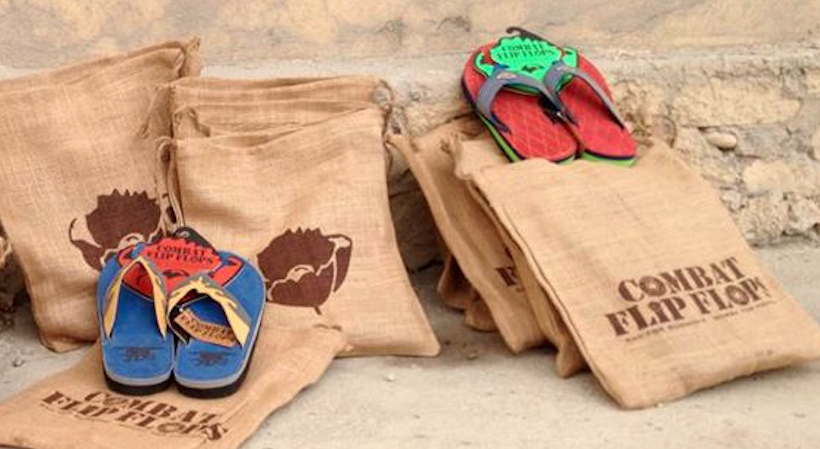As a brand strategist, I am someone who is obsessed with startup innovation, the power of design, enhanced customer experiences and brand-building as a whole. Yet last year, I started to stumble across more and more commodity product-based startups that won over consumer’s hearts by storm.
That started to fascinate me.
If brands can gain huge momentum despite selling products that are not significantly different or innovative, that feature no new technological advances, there must be a lot to learn for any other company that strives to gain followers, buyers and fans.
My fascination turned into a book, and a deep-dive journey into some of the brands (and the stories behind them) that successfully used branding in an honest, intrinsic and highly successful manner, despite their “normal” offerings.
For this, I reached out to Matt Griffin, CEO of Combat Flip Flops, to answer one specific question: How did regular flip-flops turn into objects that manufacture peace through trade?

While on duty in Afghanistan, Griffin, then a U.S. Army Ranger, stumbled upon an Afghan combat boot factory that also created flip-flops for soldiers for when they were taking off their boots to pray. Feeling empathy for the people he met, he immediately knew he wanted to bring those flip-flop designs home with the goal of creating jobs and funding education in war torn countries, such as Afghanistan.
Related: Veteran Owned and Operated Combat Flip Flops Funds Education, Provides Jobs
There is no significant product innovation, but there is a story that is so much bigger than flip-flops: one that leads to sales.
“Other than materials and details, there isn’t anything special about our product. They’re flip-flops and shoes. The story leads the way into our ecosystem, then the product enables more people to tell the story. The cycle goes round and round–educating little Afghan girls throughout the process,” Griffin said.

The cause and his strong belief is indeed the foundation of a thriving business.
If you are an entrepreneur that aches to create a cause-based brand or transform an existing brand into one that does more than sell products or services, but positively affects mankind, Matt has some advice for you.
I asked him about the top challenges such entrepreneurs may face, and below are his top three pieces of advice on how to overcome them:
- Commit fully: Question yourself. Are you willing to go all in? Give up all of your comforts and security to take on the challenge?
- Prepare for no funding: As much as people will agree with your “nice” idea and mission, getting them to separate with money to support you is difficult. You have to prove it with your own money before they give up theirs.
- Craft a story that works for your audience: For example, getting the Western Consumer to be empathetic with the challenges felt in developing nations, then inspiring them to action. Empathy is difficult these days.
Don’t be discouraged, as you are dealing with a new generation of consumers willing to commit to you and your brand. Both millennials and Generation Z consumers strongly skew toward brands with a bigger mission.
Given the rise of the BOGO movement (buy-one-give-one) through TOMS and Warby Parker, the path is clear for new ventures with a social cause.
Sign Up: Receive the StartupNation newsletter!
“TOMS will forever be known as the brand that made conscious capitalism a ‘thing.’ If they can make it work and are truly helping others, good on them. The one-for-one model works at scale and it’s tough for a lot of competition to get to that point. It’s not impossible, though,” Griffin said of such trends.
As my time with Matt was running out, I wanted to know what other cause-centric brand resonated with him that we should get to know, and why? He noted saffron distributor, Rumi Spice, which was founded by a female soldier and is now the single largest employer of Afghan women.
“They help Afghan farmers directly export product to the U.S. market, putting money into the hands of the farmers instead of middlemen,” Griffin said.
Stories like the one of Combat Flip Flops are awe-inspiring to me as a brand builder, and they also push us to think outside of our comfort zone, and outside of the notion that only products based on tech and innovation can turn into admired brands in today’s entrepreneurial age of disruption.
“Bigger Than This” is available at fine bookstores, and can be purchased via StartupNation.com.






